Co-sponsor: MIT Center for Future Civic Media
Podcast
A downloadable podcast of Our World Digitized: The Good, the Bad, the Ugly is now available.
Video
Video of Our World Digitized: The Good, the Bad, the Ugly is now available.
Summary
[this is an edited summary, not a verbatim transcript]
Moderator Henry Jenkins began by reading salient passages from the speakers’ books:
Any well functioning society depends on relationships of trust and reciprocity, in which people see their fellow citizens as potential allies, willing to help, and deserving of help when help is needed.
– Sunstein, Republic.com 2.0
A well functioning society of free expression must have two distinct requirements: first, people should be exposed to materials they would not have chosen in advance and second, many or most citizens should have a range of common experiences.
– Sunstein, Republic.com 2.0
The new freedom holds great practical promise: as a dimension of individual freedom; as a platform for better democratic participation; as a medium to foster a more critical and self-reflective culture; and in an increasingly information-dependent global economy, as a mechanism to achieve improvements in human development everywhere. – Benkler, The Wealth of Networks
Are these appropriate criteria for evaluating free expression? Jenkins asked. And if so, how effectively does the Internet realize these values?
Cass Sunstein said he liked the Benkler quotation but wondered what he meant by “individual freedom.” The notion of a self-reflective culture is provocative, and if this means a culture capable of self-appraisal and understanding, then the Internet gets a grade of C-.
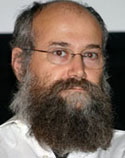 |
Yochai Benkler said he believed the C- was too harsh a grade. He agrees that relationships of trust and reciprocity are important. But he would emphasize the way in which the Net – unlike the mass media -- generates trust and reciprocity though the process of collaboration. The mass media communicate through a claim of authority. On the Net, trust and reciprocity are lived in small ways, actually experienced, whereas in the mass media they are virtues to be observed but not experienced directly.
For Benkler, the mass media create a passive citizenship. The mass media expose its readers or viewers or listeners to a flow of information and assumes (and thus establishes) a range of common experiences. But the mass media do not provide a capacity to act. In his vision, much greater importance is placed on individual agency; users filter the vast flow of information available to them based on their interests and sense of relevance; this is agenda-setting independent of government or corporate influence.
In a heterogeneous democracy, Sunstein said, unanticipated exposure to new perspectives and shared experiences are both critical. Neither of these critical elements needs to be seen as passive. Active democracies build on these shared experiences; and through them we are able to see each other as part of a shared enterprise. This sense of engaged belonging despite acknowledged differences is not generally available in the self-enclosed worlds created by most Internet users.
Benkler believes the nature of power has changed. The greater degree of freedom made available by digital technologies requires new capabilities. What constitutes an elite today? Two million people, three million? Democracies work better when more people are able to have a role in setting the agenda. The network effect of technology allows a larger set of the population to push against power from different directions.
Jenkins asked both speakers to respond to another quotation from Sunstein: “A communications system granting individuals an unlimited power to filter threatens to create excessive fragmentation” (Republic.com 2.0).
Benkler responded by pointing out that it's important to understand this issue isn't merely theoretical. Ongoing research at the Berkman Center and elsewhere is examining the structure of the public sphere and its fragmentation. He said the most effective tool for mapping the shape of online discourse and the Internet is link analysis.
His own research suggests that instead of a “daily me” the Net is creating a “daily us” where salient points within a network become linked to other networks, resulting in shared communities of interest. This implies not fragmentation but a balance between free choices and shared or common concerns.
In sites and services such as Google News, social networking sites, collaborative filtering and recommendation systems, and clusters of communities of interest Benkler sees a process that moves ideas and issues beyond specific communities. Is this, he asked, more fragmented than the mass media? Yes it is. Are there communities built around obsessing on minor things? Yes there are. But these are problems primarily to outsiders. And in any event, significant forms of sharing and commonality have emerged on the Internet. Benkler is not worried about the issue of fragmentation.
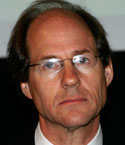 |
Sunstein is less sanguine. In a Colorado study in which he was involved, researchers looked at what happens when like-minded people are brought together to deliberate on a specific set of issues. This research showed that people end up taking a more extreme position after deliberating with others who share their beliefs. People are using the Internet to replicate this experience, and Sunstein sees that as problematic: The ability to self-select restricts or narrows our range of ideas.
Sunstein cited other research on blogging that found that conservatives link only with conservatives, liberals with liberals, and many such links accessed sites that derided the opposition. In his eyes, this is not an example of a well-functioning online public sphere.
Benkler responded that when we talk politics -- or anything else for that matter -- we tend to do it with friends and if we have disagreements we skirt the issues. We often tend to have positions consistent with the people we are similar to; that is how we function. A platform like the Internet, enabling a range of free choices, will reinforce this human tendency. Unless there is some authoritarian overlay to communication, this situation is inevitable, and not to be deplored.
Sunstein cited Jane Jacobs’ argument (in The Death and Life of Great American Cities) about the importance of serendipity in the experience of the city. An observant walker in the city may be surprised every day by sights or encounters that would alter or enlarge her. Architecture itself may shape our natures. Being exposed to the strange or the unexpected in architecture or in the range of city residents is a vital, morally instructive experience.
Jenkins next asked both speakers to consider the significance of Wikipedia.
Sunstein said he likes the fact many people are involved in the project, that entries are created not by “elites” but anyone who is engaged by a topic. He admires the ideal to which this people-created encyclopedia is committed, and he respects the project’s capacity for self-correction. But some norms or basic standards are still essential for Wikipedia to be truly effective and useful.
Benkler observed that there is no real disagreement between them on this subject. He is most impressed by how Wikipedia demonstrates the capacity of people to self-organize. The problem of accuracy is a real one, but perhaps not more compelling for an amateur or non-specialist project like Wikipedia than for traditional encyclopedias. The journal Nature examined the content of Wikipedia and found that its inaccuracies were not greater than those found in the Encyclopedia Britannica.
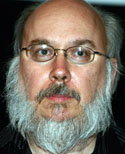 |
Jenkins asked each speaker about the models for online citizenship they envision.
Benkler said his model was simple. He wants people to see in the online world opportunities for argumentation rather than for mere complaining. He wants people to start to feel relevant, included. The Internet promises a significant change in citizenship; it’s merely not sitting in front of the TV cursing.
Learning this model will take practice, he said. Online play can provide the acquisition of necessary skills. When people are playing at seeking and finding and using information, the experience can provide a foundation for a model of citizenship. He closed by referring to Sunstein's city analogy, pointing out that there is pain and risk on the Net just as there is in a city. Just as we wouldn't give up on the value of urban experience because of the isolation or fear it can engender, neither should we yield to pessimism about the Internet.
Sunstein urged us to distinguish between consumers and citizens. Consumers can share data and in many cases the distinction between consumers and citizens might not matter. But in some cases they do, and citizenship involves more complex forms of engagement than mere consumption. Too much of the Internet today is about providing consumer data instead of the more difficult and demanding information needed by citizens.
Discussion
QUESTION: How much do the tools affect our discourse? Will new tools change things?
SUNSTEIN: I think that people are hardwired in two ways: first, they cluster with like-minded people and second they are curious. I think one virtue of the Internet is its ability to work against clustering and for curiosity. The communications norms that develop will help determine which one wins.
BENKLER: To what degree are we really hardwired? What is the impact of the tools we adopt versus the tools we could adopt versus our ability to change as a result of the tools? I believe we are plastic and are able to change. It's not just about internal hardwiring, it’s also about cultural influence and affordances.
QUESTION: Regarding the idea of unexpected results, does this lead to more but less deep communication?
SUNSTEIN: It's true that you might have more people speaking less deeply; but it's good for there to be events that are shared but experienced differently. The Web can be used to help create shared experiences.
QUESTION: You both have spoken about Wikipedia, but there have been other Wikimedia projects that were not successful, such as Wikinews. Do you think part of the problem was the requirement of neutrality?
SUNSTEIN: Lostpedia – an Internet site by fans of the TV series Lost -- is another example of collaboration and shows how collaboration can work. Collaboration happens when people have an intense interest in a shared experience. Wikinews? What need was it fulfilling? The Internet already provides news. Wikipedia and Lostpedia work because they fulfill unmet needs.
QUESTION: Concerning the issue of partisanship and the way in which online groupings may limit themselves only to the like-minded: Isn’t our two-party system one source of the problem? Is such a polarized and limited arrangement the most conducive for a democracy?
SUNSTEIN: This is a large question of political organization. Does our two-party system mean we have to have polarization? You can imagine a world with more than two parties that is polarized. You can also imagine a two-party system where the two parties are not polarized. There are advantages to multi-party systems but they don't necessarily prevent polarization.
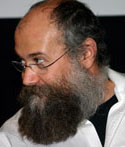 |
BENKLER: The two-party system has obliterated the left and right and moved everyone to the middle. It brings everyone closer. We don't have the same kinds of extremes in the U.S. that you find in many places. In fact, the two-party system can actually decrease polarization.
QUESTION: I'm in favor of polarization and clustering. Few people are deluded about the limited amount of power they have. Isn’t power generated when people cluster and communities come together?
SUNSTEIN: If like-minded people listen to others with a different point of view they tend to become less engaged and more passive. Engagement is often fueled by similar opinions.
BENKLER: We both oppose the idea of pluralism; we view democracy as something that moves beyond simple competition among interests.
QUESTION: Can frivolous online activities prepare for more valuable civic engagement or is there an inherent value in play?
SUNSTEIN: Both. Sites like Lostpedia are a good thing for those who really enjoy it and find it fun. Those of us interested in citizenship shouldn't ignore play, especially when it has an active rather than a passive feature. You're also correct that it can be helpful on the preparatory side. A reasonable thought is that those who engage their minds actively may be better prepared to be citizens when the time comes.
QUESTION: The chief technology officer of Wikipedia once said that it's a site any idiot can edit and that the gamble is that there are more good idiots than bad idiots. I read your book Infotopia as an indictment of the collective impulse to use a deliberative process and consensus to arrive at high-quality information. How do you reconcile that with your relative optimism about Wikipedia?
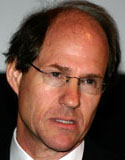 |
SUNSTEIN: We know that deliberating groups are subject to four types of failure: They often amplify rather than correct biases; often people are vulnerable to polarization as discussed in the Colorado example; frequently early speakers will start a cascade in which people don't share their own information and; perhaps saddest of all, information shared among a subgroup of three or four people can crowd out the unique contributions of others to the detriment of the group. When a wiki operates well and with strong norms, none of these mistakes happen.
QUESTION: Thinking about different views of democracy and the idea of the city and the Net, it seems that in some ways independent Web sites function as their own cities with their own rules for participation and citizenship. Is it worthwhile to look at these sites as independent cities and try to determine how users-citizens might interact with democracy?
SUNSTEIN: Yes, especially if we want to test a specific hypothesis. For example, we might have a hypothesis about behavior on YouTube and then we have a place where we can test the hypothesis.
BENKLER: My sense is that it would be a good metaphor for some and not for others. YouTube is complicated because so much of the interaction with the content happens beyond the site through widgets and integration. It's also not really a collaborative site..
QUESTION: How will virtual worlds and the ability to actually see a representation of the other person affect citizenship online?
BENKLER: When I hear this question I feel like an old fogey because it reminds me of the early years of cyberspace when people were texting each other and saying it was just like being there. Second Life is looking at how our visual perceptions affect us emotionally in ways provided by a richly rendered and immersive environment. I want to see what happens in practice once these types of worlds become more widespread.
QUESTION: Is the ability to see more online interaction face-to-face, using cams for example, rather than through a virtual world like Second Life, changing the dynamic of all this?
SUNSTEIN: I think that for the purpose of many of the things we've discussed, it doesn't really matter much. The Colorado experiment was all face-to-face and polarization occurred and that same dynamic happens online.
BENKLER: Based on the work I've begun to do on collaboration, I believe that face-to-face communications seems to affect people in experimental situations. They tend to be more cooperative and generous toward one another.





